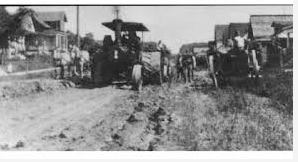by Marvin Wingfield | Aug 28, 2014 | stories
My grandfather (1878-1959) worked for the C&O railroad in Virginia. I think he was a brakeman. Once I said something to him about the necessity of a “living wage.” He stopped me. “No, what there should be is a ‘saving wage”” I guess in his generation they had higher expectations about what working people could...
by S Harrell | Aug 28, 2014 | stories
All four of my grandparents were farmers in southeastern Georgia. They taught me the value of taking pride in a job well done. They tilled the land, fed their families and the families of people who worked for them, and raised and sold crops. They went to work from sun up to sun down, six days a week and didn’t whine about it. Their faith, their families, and their farms were their sources of comfort, community, and connection to deep and meaningful work. I try everyday to show the same humility and quiet dignity. Their genetic “echoes” are with me today in my love of tilling the soil, planting seeds, tending plants, and harvesting and sharing Earth’s bounty. Far from their farms in Georgia, I’ve chosen the path of helping professional–health & wellness coach and teacher. Because of Irene, Frank, Mattie, and Paul, I’m a gardener of the soil and the soul, always seeking ways to create containers in which people, plants, and the planet can...

by Kathy Spera | Aug 28, 2014 | stories
My grandfather on my adopted dad’s side came from Capistrano Italy in 1906 at the age of 19, was a WWI veteran, and later had one of the hardest jobs I know of – bricking and paving streets shoveling gravel and mixing mortar to complete many of Irondequoit and downtown Rochester NY’s streets and curbways. It was during the depression era when jobs were scarce and how this barely got he, my grandmother and three children by. Times were especially hard during the winter as most times there was no work in the trade so he would paint, carpenter, and do other odd jobs he could find from the local labor halls to keep food on the table and so the kids would not go hungry and have some sort of Christmas. I remember him telling me in his broken English how unsafe the work was and how helpless he felt when an accident killed one of his co-workers when a chain broke that supposedly was securing the back hatch to the dumptruck carrying hot tar laden gravel. The foreman then were not so empathetic and there were no provisions as there still aren’t for labor pool and construction worker’s family survivors. My grandfather bore a deformed nail on his thumb when another foreman missed hammering a casart for a grid line forming curbs. No workman’s comp in those days. Surprisingly and gratefully I am proud to say that my grandfather lived until he was one single day away from his 100th birthday. He worked very hard, my grandmother was a homemaker after she and my grandfather were married....
by C. James Spellane | Aug 28, 2014 | stories
My father’s father came to America from Ireland at the age of 12. He eventually became a supervisor at an ice company in Brooklyn, New York. This was at a time when most people did not have electric refrigerators and still had ice delivered in blocks for their iceboxes at home. In 1935, there was an explosion at the plant on Stilwell Avenue. My grandfather initially got out safely but went back in to help his co-workers. He was badly burned and later died leaving a widow and six children. I was born 14 years later. My father told me the story and in addition to making me sad, it inspired me that he cared enough about his mates to try to help them. I hope I have shown a fraction of his courage in my life. And I am glad that I have had the opportunity to work for a union that holds safety as a fundamental...
by Peter M. Curry | Aug 28, 2014 | stories
My grandfather was born in 1855, soon after his parents had immigrated from Ireland. He and his brother were left with an order of Roman Catholic monks in or near Pawtucket RI. when their parents went west to improve their economic situation; their ages were 9 and 7. They worked to earn their keep in one of Pawtucket’s textile mills, possibly the famous Slater’s Mill. There, they were introduced to the cutting edge industrial technology of the time but also had to endure oppressive working conditions and, needless to say, received a pittance for wages. After a few years, the parents, not having found the level of prosperity in Wyoming or Montana they had hoped for, returned and the family resettled in northeastern CT where parents and children simultaneously worked at subsistence farming and as mill hands in the numerous textile mills that were springing up in that area. Formal schooling was not part of the narrative. My grandfather — probably drawing on his early experience as an apprentice mill worker in RI — eventually became a “mule spinner” and went to work in what became one of the largest textile manufacturing facilities in the country — a complex of 5 mills. He then worked for that company for 55 years, not retiring until he was past 75 years of age. Over time, he “worked his way up” to be Assistant Overseer of one of the mills in the complex — the “glass ceiling” for an Irish Catholic in that day and time. Fast forward to 1925. Prolonged labor strife culminated in a general strike of all the mills...

